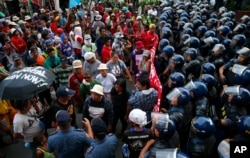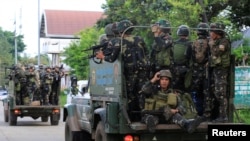An extension of martial law in the Philippine south through December indicates the government lacks a quick way out of its armed conflict against a group of ISIS-inspired Muslim rebels, but underscores how seriously it’s taking the fight.
On Saturday, the Philippine Congress voted 261-18 to put the southern island of Mindanao under martial law through the end of the year and give troops a new edge in their fight against the Maute Group in battles characterized by ambushes and executions of civilians.
“The war is still ongoing and it’s difficult for people in Manila to know what’s going on,” said Rhona Canoy, president of an international school and part of a political family in the Mindanao city Cagayan de Oro. “The president or the military, they have to make an instant decision,” she said, speaking hypothetically. “Mindanao being under martial law would make that an easier situation to deal with.”
Protracted battle against Muslim rebels
Troops have been fighting in Marawi city since May 23 to rout the rebels suspected of forming ties with Abu Sayyaf, a Philippine group known for kidnapping and beheading foreign tourists. ISIS, the Muslim terrorist group based in Iraq and Syria, has tapped an Abu Sayyaf leader to be its Southeast Asia emir, news media and academic studies say.
Gunfire in Marawi has killed 105 troops, 428 militants and 45 civilians, domestic media said Sunday.
Officials from the government of President Rodrigo Duterte said in June the Maute Group had been confined to four neighborhoods of Marawi, a city of 200,000 people before civilians began fleeing the battle scene. But that month the Armed Forces of the Philippines apologized that the war was taking so long and hinted at a longer struggle.
Fighting could endure because, per military accounts, the rebels have received help from sympathizers in fellow Muslim countries such as Indonesia. Scholars believe the Maute Group also has enough money to arm itself for longer than the government might expect.
The Maute Group, which formed in 2013 by two brothers said to dislike non-Muslims, may be getting money from trade in illegal drugs such as the methamphetamine strain “shabu,” a professor in Mindanao told Philippines-based ABS-CBN News in June. “Weak governance structures and institutions” on the island make it “easy for drug lords and even war lords,” the news report said.
How martial law helps troops fight militants
Martial law lets troops make some staffing and resource decisions without checks and balances that could set back plans. Road checkpoints and curfews give troops an idea of who's where.
“The rebellion in Marawi continues to persist and we want to stop the spread of the evil ideology of terrorism and free the people of Mindanao from the tyranny of lawlessness and violent extremism,” Duterte’s spokesman Ernesto Abella said on the presidential office website. The Constitution allows for martial law to handle “invasion or rebellion,” he added.
As of Sunday, 1,723 people had been rescued from villages hit by fighting. Some reports say militants have killed civilians for giving sensitive information to troops.
Martial law gives troops the option to broaden its fight to other parts of Mindanao that might pick up the Maute Group’s cause if it’s quashed.
Previous defeats in Mindanao, where 20 Muslim rebel groups are based, tend only to anger sympathizers into regrouping according to Eduardo Araral, Mindanao native and an associate professor at the National University of Singapore’s public policy school.
Muslims who settled on Mindanao and along the adjacent Sulu Sea centuries ago resent the Philippine Catholic majority for what they see as control of national resources. Many in their region live in poverty, seeding armed rebellions that have left about 120,000 people dead since the 1960s.
“In the long history of warfare in Mindanao, when the leader is killed, usually the organization would splinter into different smaller groups,” Araral said. “It’s like an amoeba, they just break up. You whack it and then they just splinter into smaller groups and they form again.”
Public support for martial law
An opinion poll by the Metro Manila-based research institution Social Weather Stations found that 57 percent of Filipinos support the extension of martial law.
People in Cagayan de Oro face a major highway checkpoint on the way to the local airport and hear air force helicopters overhead, Canoy said. But for most people there, she said, “life is going on.”
Outsiders such as investors may be heartened that Congress backed up Duterte’s request for an extension of martial law, showing that checks and balances work, but may worry about whether the government can get a grip on rebels after an optimistic start in May, said Christian de Guzman, vice president and senior credit officer with Moody’s in Singapore.
He added sentiment toward Mindanao was never strong.
“From the outsider point of view, I think the bar has been so low at the outset that failures to meet (the government’s) desired objective didn’t come as a surprise, so I don’t think there’s been a big change from their outsider perspective,” de Guzman said. “It’s always been kind of negative.”






